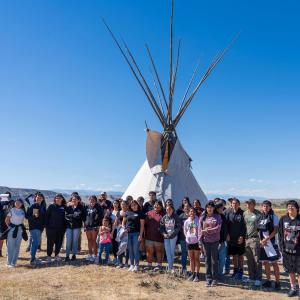Wind River Indigenous Youth Culture & Climate Camps
Date
Grassroots to Governance* is a Wind River specific holistic approach that involves engaging and empowering people at the local, community level (grassroots) and extending their involvement and influence up to the higher levels of decision-making (Tribal governance). This approach emphasizes the importance of bringing together Elders, young people, science, and Tribal governance, with Mother Earth to educate and involve all communities within the Wind River Reservation. It is important now more than ever in the context of the climate crisis. Towards this end, Janna Black, the new Tribal Climate Resilience Liaison for the Great Plains Tribal Water Alliance, has been working with Indigenous youth climate camps to empower the next generation of Indigenous leaders. Black is of Athabaskan descent and her work is deeply influenced by her connection to place, emphasizing land-based learning approaches through a kincentric ecological perspective. As she says, “Building a sense of place that is rooted in culture enables a strong foundation for cultural revitalization and Indigenous empowerment.”
These youth culture and climate camps highlight the significance of Indigenous Traditional Ecological Knowledge and practices in understanding and addressing climate change, helping to strengthen the cultural identity of Indigenous youth and fostering a deeper connection to their land and community. By participating in these camps, youth develop leadership skills, confidence, and a sense of responsibility to take action on climate change. This is essential for ensuring that future generations are prepared to lead their communities in sustainable ways. Additionally, the camps encourage participants to engage with their communities and share what they have learned, leading to increased community awareness and collective action on environmental issues. These youth culture and climate camps provide opportunities for participants to connect not only with peers, but with their Elders, community members, and experts in the field of climate change. This kind of networking can lead to more collaborative efforts.
The importance of Indigenous youth culture and climate camps lies in the fact that they are not only providing education on culture, climate science and environmental stewardship, but they are also helping to nurture a generation of Indigenous leaders who are knowledgeable, culturally grounded, and equipped to address the challenges of climate change in their communities. According to Black, “intergenerational land-based learning creates a nurturing environment for Elders to share their wisdom with the next generation.” Participants learn about specific impacts of climate change on their communities, and leave with ideas of how to weave a tapestry of culture and conservation for generations to come.
In her new position, Janna is dedicated to cultivating enduring relationships and meaningful connections with Tribal nations within the North Central Climate Adaptation Science Center (NC CASC) service area, encompassing Wyoming, Colorado, Montana, North Dakota, South Dakota, Nebraska, and Kansas. Her primary goals include disseminating the latest climate science information, understanding research needs to support Tribal scientific initiatives, and providing assistance to enhance climate resilience in Tribal communities. Among the upcoming projects are collaborating with Wind River to organize another culture and climate Camp, supporting Dr. Molly Cross in addressing NC Tribal Needs for National Synthesis, and assisting Dr. Heather Yocum in the NC CASC Rapid Climate Assessment Program (RCAP) to identify and analyze climate adaptation plans, vulnerability assessments, drought or hazard plans, and related strategies from Tribal Nations across the NC CASC region.
*Wes Martel's vision (Greater Yellowstone Coalition, Fort Washakie Branch)
photo credit: GYC/London Bernier


